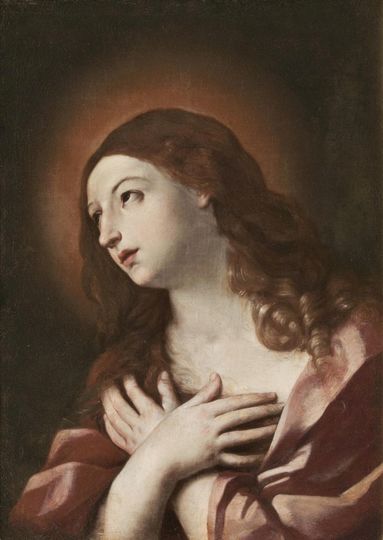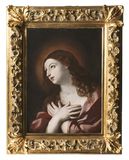Mary Magdalene
Guido Reni, Werkstatt oder nächster Umkreis (Bologna 1575 - Bologna 1642), studio or close circle

Lot-No. 15
Probably Francesco Gessi (1588 Bologna - 1649 Bologna. First half 17th cent., oil/canvas, 75 x 55 cm, min. rest., relined. - Expertise: According to the pigment analysis the painting has ist origin in the first half of the 17th cent. - Provenance: Private collection Sweden. - One of the most important painters of Italian Baroque. Together with F. Albani a. Domenichino he was taught in the studio of D. Calvaert, around 1595 the three of them changed to L. Carraccis 'Accademia degli Incamminati'. In 1601 R. went to Rome with A. Caracci where he, patronized by the Borghese family, rose to a leading position. After a short sojourn in Naples he returned to Bologna where he was able to win over the most influental patrons. His style, influenced by the Carracci but also by Raphael a. Caravaggio, was most suitable to serve different commissions. Mus.: Paris (Louvre), London (Nat. Gall.), Rome (Vatican), Madrid (Prado), Milan (Brera), Vienna (Kunsthistorisches Museum) a. others. Lit.: Thieme-Becker, Bénézit a. others.
Guido Reni, Werkstatt oder nächster Umkreis: Mary Magdalene
Guido Reni, Werkstatt oder nächster Umkreis (Bologna 1575 - Bologna 1642), studio or close circle
Mary Magdalene
Lot-No. 15
Probably Francesco Gessi (1588 Bologna - 1649 Bologna. First half 17th cent., oil/canvas, 75 x 55 cm, min. rest., relined. - Expertise: According to the pigment analysis the painting has ist origin in the first half of the 17th cent. - Provenance: Private collection Sweden. - One of the most important painters of Italian Baroque. Together with F. Albani a. Domenichino he was taught in the studio of D. Calvaert, around 1595 the three of them changed to L. Carraccis 'Accademia degli Incamminati'. In 1601 R. went to Rome with A. Caracci where he, patronized by the Borghese family, rose to a leading position. After a short sojourn in Naples he returned to Bologna where he was able to win over the most influental patrons. His style, influenced by the Carracci but also by Raphael a. Caravaggio, was most suitable to serve different commissions. Mus.: Paris (Louvre), London (Nat. Gall.), Rome (Vatican), Madrid (Prado), Milan (Brera), Vienna (Kunsthistorisches Museum) a. others. Lit.: Thieme-Becker, Bénézit a. others.




